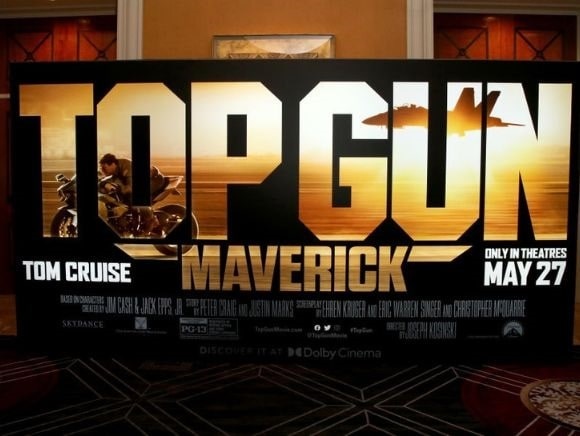
(Photo by Gabe Ginsberg/WireImage)
Movies come and go, and some leave behind a cultural legacy. Others are just fun-filled action romps. But for conservatives, with a strong desire for a woke-free film, the pickings are few and far between. Top Gun: Maverick may not end up having the same enduring cultural impact as its 1986 predecessor, yet it is an important cinematic product nonetheless.
So Long CGI
 While some aspects of the sequel relied on computer-generated imagery (CGI), the flying sequences were genuine. Filming took place in actual cockpits during actual flights, and the impact of g-force on the actors as the aircraft accelerated was a hardship few Hollywood folks have to endure.
While some aspects of the sequel relied on computer-generated imagery (CGI), the flying sequences were genuine. Filming took place in actual cockpits during actual flights, and the impact of g-force on the actors as the aircraft accelerated was a hardship few Hollywood folks have to endure.
Modern action movies – especially those from the Marvel stable – rely heavily on CGI, and although the results can be visually stunning, they lack the authenticity of practical effects. Actor Tom Cruise is well known for his willingness to perform his own stunts and is, in fact, a licensed pilot; apparently, the realism was a condition of his involvement in the project.
When the action is live, the audience gets not only great entertainment, but the satisfaction of knowing that experts were involved in the production and contributed to the realism – something sadly missing from many movies.
Say No to China
As more movies try to capture the enormous Chinese market, subtle changes are made in foreign and domestic distribution, and actors are generally kept on a short leash regarding their off-screen comments. When John Cena made a comment about Taiwan while promoting his upcoming Fast & Furious franchise release in 2021, he issued an embarrassing public apology in Mandarin Chinese. He said, “I made one mistake, I must say right now, very important, I love and respect Chinese people. I am very sorry for my mistake. I am so sorry, I apologize.” His “mistake” was acknowledging the existence of Taiwan as a nation.
Not so for Maverick.
In fact, the Top Gun installment does not yet even have a Chinese release date. This is likely due to two factors. First, the main character, Pete “Maverick” Mitchell, has a Taiwanese flag on his apparel in apparent tribute to the character’s father’s war service in the Pacific. The other reason is that with so few American films getting a release into the mega-market, one that shows off American military power is unlikely to please the Beijing bigwigs.
Breaking the Streaming Model

(Photo by Phillip Faraone/Getty Images for Paramount Pictures)
Notably, Maverick has not been released to any streaming services and won’t be for some time. With corporations like Amazon and Netflix relying heavily on the home consumption audience, many in the production industry have speculated that cinema and the cinema experience are a thing of the past. However, rumors of its demise appear to have been greatly exaggerated.
Breaking the Memorial Day weekend box office record, the Tom Cruise extravaganza pulled in a whopping $156 million domestically, shattering the previous 2007 record by a cool three million. As movie fans break their COVID-inspired abstinence of venturing out for entertainment, a pre-summer blockbuster is just the thing to get potential consumers back on the Hollywood horse.
Unashamedly Pro-America
When the first Top Gun movie was released, several theaters saw US Navy recruitment booths set up outside in the hopes of capturing some of that patriotic fervor. And while it’s difficult to imagine such a blatant scheme in today’s politicized climate, the fact that this movie is so unabashedly celebratory of American military prowess has not put off ticket sales.
Perhaps the falling movie theatre revenues and disengagement from entertainment media over the last few years was not the death knell of an industry in demise but rather a reaction to the glorification of woke ideals and the vilification of conservative-leaning thought. When patriots are villains and American exceptionalism is portrayed as “the problem,” is it any wonder that those who love their country and the magnificence of its achievements are turned off by stories that have a fundamentally opposite worldview to their own?
Top Gun: Maverick’s success at the box office appears to be sending a signal to Hollywood that Americans are more interested in entertainment than politically correct propaganda. The question is whether Tinsletown will hear this message, learn from it, and stop trying to indoctrinate its audience.
Remember to check out the web’s best conservative news aggregator
Whatfinger.com — the #1 Alternative to the Drudge

